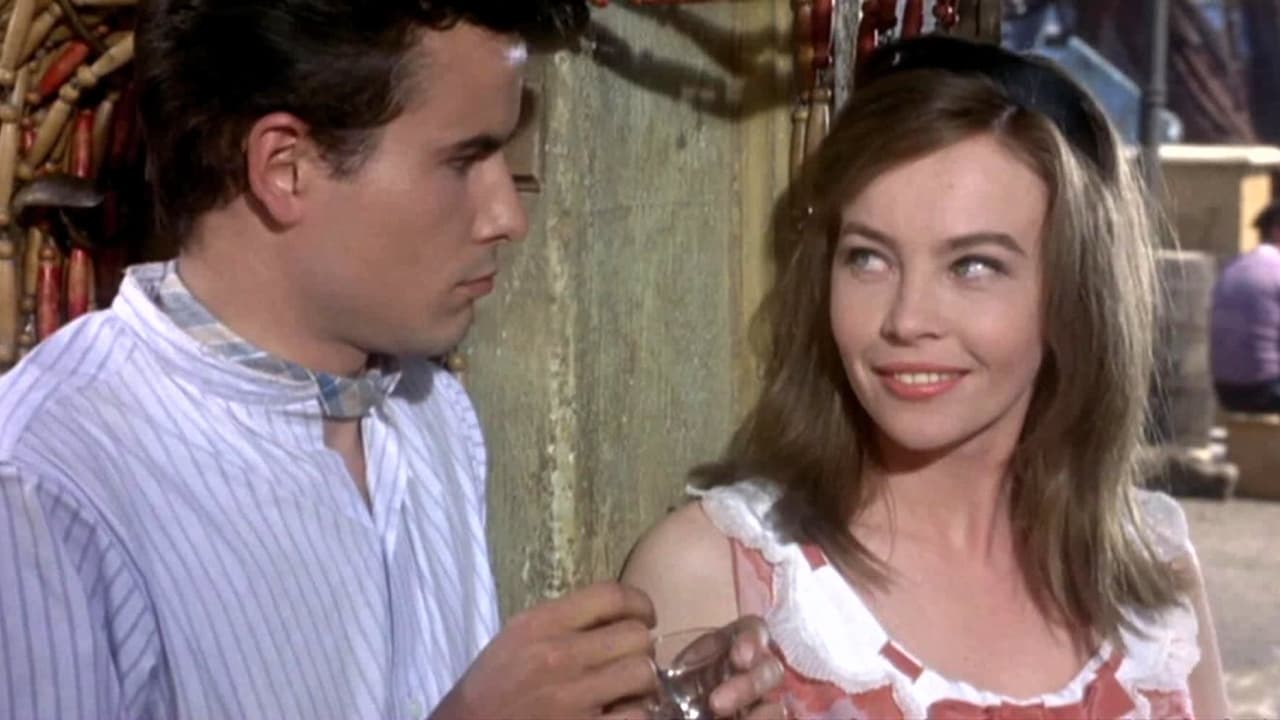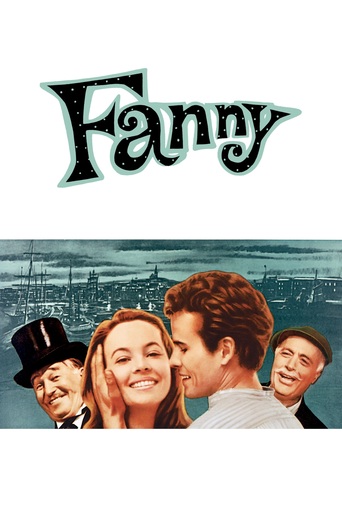

The story opens amid the noisy fish stalls and bars of Marseille, where we meet 18-year old Fanny (Leslie Caron) who has been in love with Marius (Horst Buchholz) all her life. He loves her, too, but has always dreamed of running away on a sailing ship. The night before he is to leave, he and Fanny profess their love for each other. Will he stay with her or go to sea? What a wonderful movie! I loved it as a teenager and was very surprised to find I love it more now. The story moves slowly and we get to know and care for the colorful characters of the bustling waterfront, especially Marius' father (played by Charles Boyer) and his wealthy friend (played by Maurice Chevalier in an Oscar-worthy performance that will break your heart). Caron is a lovely Fanny and Buchholz's Marius is dreamy and full of angst; their love spans many years and we see them grow up and mature. At the end they are both sadder and wiser and you'll be reaching for the tissues.The strong bonds of love and respect from family and friends make this a heartwarming story. The location photography is beautiful and the romantic soundtrack is unforgettable. Highly recommended.
... View MoreIn the early 1930s Marcel Pagnol wrote a series of plays concerning the intertwined lives of a set of characters in the city of Marseilles. The plays were each centered on a chief character: FANNY, MARIUS, and CESAR. Fanny is the daughter of a fishmonger Honorine, and has grown up with Marius, the son of Cesar a café owner. Cesar is a neighbor and friend of Panisse, a wealthy businessman. Marius has grown handsome and Fanny is pretty, and they are in love. But Marius has a wanderlust, encouraged by a local figure "the Admiral". So when he reaches the age of 19 he is confronted by a dilemma. He is about to present his sailors papers to a sea captain, but he is also jealous of anyone who is trying to attract Fanny, especially the elderly Panisse. But the lure of the sea is too much, and after a final evening with Fanny in which they admit their love for each other (and have a sexual encounter), Marius flees with the boat. A couple of months later Fanny finds she is pregnant. Taking advantage of Panisse's offer of marriage (although he is aware of her situation), Fanny marries the elderly suitor. This enables her child (a son) to be born legitimately (and to allow the Panisse family not to die out). But Marius (when he returns - disillusioned by the non-romantic trip abroad (his comment about south-sea islands is the basis of the "summary line" above) finds he has lost Fanny and his son, and cannot even return to living at his old home. The resolution is the subject of the third play.Aside from the success of the trilogy of French films, the story was made into a successful Broadway musical called FANNY with Florence Henderson in the title part and with Ezio Pinza as Cesar. This 1961 film version does not use any of the songs from the score, but it does use the themes of the score for the background music. This version by Joshua Logan has Leslie Caron in the title role, Horst Buchholz as Marius, Charles Boyer as Cesar, Maurice Chevalier as Panisse, and Georgette Anyss as Honorine. All of the performances are good, with moments that make the characters quite human (Boyer yelling at Marius or some other employee in his café about their not making a particular drink correctly, or Anyss returning to the waterfront, years after she has moved to Panisse's country house, and realizing how much she has missed the smell of the fish she used to sell). The story is actually quite human and humane too, not only in the situation facing the unwed Fanny and Panisse's willingness to help her preserve her reputation and his family line, but also in the resolution (again handled by Panisse, as he is dying) to restore normality to the young people. It is not a perfect film, but it certainly is well photographed in Marseilles (including some shots of the notorious Château D'if of THE COUNT OF MONTE CRISTO), and gives us a view of France in the early 1930s, before the onrush of European events led to the disastrous defeat of 1940. Note also, besides the leads, the support by Lionel Jeffreys (as an English friend of Panisse and Cesar) and Salvatore Baccaloni as intimates of the families, who join Boyer and Chevalier in playing pranks on passersby (with a hat - you'll have to see it to understand). I'm even glad to see Victor Francen in one of his last movie roles, as Panisse's older brother - thanking Fanny for saving the family name.Boyer and Chevalier had never worked on a film together before (unlike Chevalier and Caron in GIGI), and now got to know each other. It did help as they seem to blend together quite nicely in several comic confrontation scenes. Boyer would come to chat with Chevalier when neither was needed on the set, and they were in their trailers. Here Boyer did find one unsettling habit of Chevalier. Chevalier had been rather poor as a young man, and his habits of thrift remained with him as an elderly one. Boyer was quietly appalled to find that if they were having a glass of Chevalier's wine the entertainer would cut a groove into the bottle at a certain point with a ring. No wine would be poured below that groove mark.
... View MoreLeslie Caron is quite wonderful playing the love-starved daughter of a fish-market saleswoman on the Paris waterfront who sets her sights on the son of the tavern owner. After a night in her bed, the paths of the young lovers separate, but soon there's a baby on the way and Caron realizes a father will be needed so as not to shame her hard-working mother. Marcel Pagnol's star-crossed trilogy ("Marius", "Fanny", and "César") about life and love in Marseille was first turned into a hit Broadway musical, soon adapted into this non-musical film directed by Joshua Logan. You can easily spot where the songs might have been (the scenes surge forth in emotion, but have no emotional outlet beyond the dialogue). However, Caron just kept getting better and better as an actress, and any trace of self-consciousness as a performer was, by this point, minute. Lots of wily eccentrics dot the supporting cast, with friendly adversaries Maurice Chevalier and Charles Boyer relishing their roles (they're both deliciously mad, like characters out of Lewis Carroll). As the baby's father, Horst Buchholz is handsome and has a few fine scenes, but he's out of his league within this company and doesn't quite connect with Boyer, portraying his father. The film is long and contains possibly too many Mount Rushmore close-ups of La Caron, but indeed it's a handsome piece of work, with Harold Rome's songs now used for the pleasant background score. If viewers can get through the clunky first act, the absorbing plot becomes a surprisingly fine study of missed opportunities, decisions, and human feelings. *** from ****
... View MoreI saw 'Fanny', for the first time, in a theater in 1962 and have never been disappointed on any of the scores of times viewing it since. The acting of the entire crew is their best, in my opinion. The casting could not have been better and the scenery... magnificent!! I now own the 1930's version of the trilogy and haven't watched it (don't want to spoil the 1961 version). The story is about a young couple, growing up in a seaport in France, and fall in love. The boy, Marius, also loves the sea and when a sailing ship comes in, he leaves for the 'islands beneath the wind'. after being gone for five years, he returns to visit his father, and what he finds changes his life. A must see.
... View More